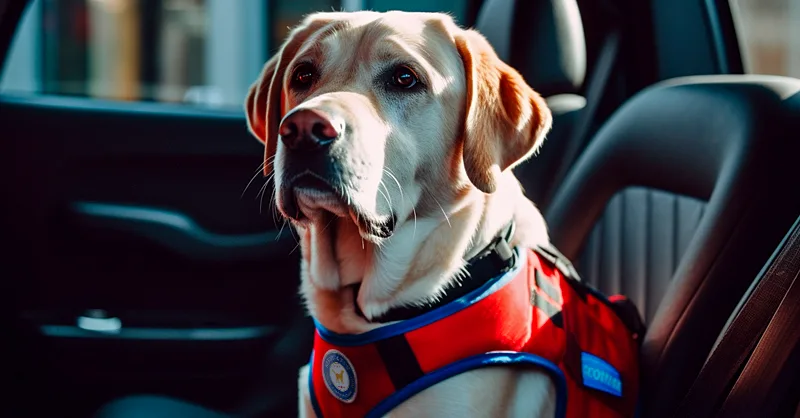Archive for the ‘Service Dog Tips’ Category
Uber’s policy: Service dogs are allowed to ride with their handlers at no extra cost. According to Uber’s guidelines, drivers are required to accommodate service animals and provide them with the same level of service as any other passenger.
What if your driver gives you a hard time?If an Uber driver refuses to allow your service dog in the car or you face harassment, you can file a complaint with Uber.
To file a report from the Uber Rider App, navigate to the “I Want To Report A Service Animal Issue” screen, available through the trip details screen and the account menu button.
After you file a report, Uber’s team will investigate the incident and act under its Service Animal Policy.
Uber Cleaning FeesYou do not have to pay any additional cleaning fees for hair or shedding from your service dog. If you are charged a cleaning fee after your ride has ended, you can contact Uber to request a refund.
Proving you have a service dogIf the driver wants to verify that you own a service dog, they can ask two questions: 1. Is the dog a service dog required for a disability? and 2. What work or task has the dog been trained to perform?
It can also be helpful to identify your dog as a service animal by carrying an ID card or using accessories like vests and tags. The driver, however, cannot refuse your ride if you do not have these items.
Practical Tips 💡 Make sure the driver is aware that your dog is a service animal so they do not mistakenly believe that it is a pet. Most drivers appreciate it if you keep your service dog on the vehicle’s floor (unless your service dog is needed on your lap or by your side to provide its disability-related service). You are not responsible for cleaning fees for hair or shedding. However, it’s courteous to clean up after your dog whenever possible.Individuals in Illinois who require the assistance of a service dog are recognized and protected by federal and state laws. The Americans with Disabilities Act (ADA) and the Illinois Human Rights Act safeguard the rights of service dog owners in the Prairie State.
Illinois law allows service dogs to enter public areas, including places where dogs are typically prohibited. Keep reading to learn more about the requirements and rights of service dogs in Illinois.
Health RequirementsTo be eligible for a service dog in Illinois, the handler must have a qualifying physical or mental health disability. A “disability” is defined as a physical or mental impairment that significantly restricts a major life activity such as working, socializing, or attending school.
Physical disabilities include visual impairment, hearing loss, and seizures. Meanwhile, psychiatric disabilities include conditions like severe depression, anxiety, post-traumatic stress disorder (PTSD), and autism. Psychiatric service dogs are trained to support individuals with mental health conditions.
Training RequirementsMerely having a qualifying disability does not automatically qualify an individual for a service dog in Illinois. The dog must be specifically trained to perform tasks directly related to the handler’s condition.
Service dogs are trained to perform a wide range of tasks. Some examples of tasks for physical disabilities include pulling wheelchairs, guiding individuals with visual impairments, and providing assistance during seizures.
On the other hand, tasks for psychiatric disabilities may include retrieving medication, providing tactile stimulation during moments of crisis, calming the handler during panic attacks, and assisting in crowded environments.
It is essential to note that service dogs in training do not have the same public access rights as fully trained service dogs.
Keeping a training log will help with analyzing the progress of your service dog’s training. Download this free sample Service Dog Training Log, provided by Service Dog Certifications.
Identification Requirements for Service Dogs in IllinoisWhile most service dog owners use accessories like ID cards, vests, tags, and certificates to signal that their dog is a service dog, these items are not required in Illinois. However, service dog owners may prefer to use these items to identify their dogs as service animals and prevent unwanted interactions with their dogs while on duty.
When a service dog handler’s disability is not apparent, stores, restaurants, and other public venues in Illinois may ask two questions to determine if the dog is a service dog:
Is the animal a service dog required for a disability? What work or task has the dog been trained to perform? Service Dog Registration in IllinoisThere is no specific registration requirement for service dogs in Illinois. However, you may have to register your dog if there is a local rule that requires registration of all dogs.
While service dog registration is optional, many handlers choose to register their service dogs voluntarily. By registering their service dogs with a service like Service Dog Certifications, the dog’s information is entered into a searchable database linked to an ID card.
Service dog handlers can use this card to demonstrate that their dog is a service dog, which may be convenient when third parties demand documentation. However, keep in mind that no one can condition entry of a service dog on having any type of documentation or paraphernalia.
A service dog registration in Illinois can be useful to service dog handlers when confronted with the outside world. Psychiatric Service Dog RequirementsWhile most people associate service dogs with physical disabilities, service dogs also support individuals with psychiatric disabilities. In Illinois, psychiatric service dogs (PSD) have the same legal rights as other types of service dogs, as they are equally important to their handlers’ health management.
Psychiatric service dogs perform a wide range of tasks, including:
deep pressure therapy reminding the handler to take medication posting and watching the handler’s back in open areas providing tactile stimulation alerting the handler to oncoming threats or episodes disrupting repetitive self-destructive behaviors Wonder if you qualify for a Psychiatric Service Dog?Get an assessment from a licensed medical health professional. If you qualify, they can issue a PSD Letter so that you can confidently train and own a PSD. Where Can Service Dogs Go in Illinois?Service dogs in Illinois are permitted to accompany their handlers in public areas that do not allow pets. For example, handlers can bring their service dog to restaurants, shops, hospitals, schools, and hotels.
Service dogs also have housing rights and must be allowed to live with their handlers, even in buildings prohibiting dogs.
Service Dog Legal Cases in IllinoisThird parties can get in trouble when they violate the rights of service dog owners. There have been many legal cases involving service dogs in Illinois.
One of the cases involved a woman with a service dog who was denied access to a local restaurant. The woman filed a complaint with the Illinois Attorney General’s office, which resulted in a settlement requiring the restaurant to train its employees on the Americans with Disabilities Act (ADA) and pay a fine.
Another case involved a student with a service dog who was denied access to a university dormitory. The student filed a complaint with the U.S. Department of Education’s Office for Civil Rights, which resulted in a settlement requiring the university to revise its policies and pay a fine.
In a third case, a woman with a service dog was denied access to a hospital. The woman filed a complaint with the Illinois Department of Human Rights, which found the hospital had violated the Illinois Human Rights Act and ordered the hospital to pay damages to the woman.
These cases illustrate the importance of understanding the laws and regulations related to service dogs in Illinois and ensuring that individuals with disabilities are able to access public venues with their service animals.
Residents of Pennsylvania who require a service dog are legally recognized under federal and state law. The ADA and the Pennsylvania Human Relations Act protect owners of service dogs in the Keystone State.
Service dogs in Pennsylvania must be allowed in areas open to the public, even if there is a policy that prohibits entry to normal dogs. Read on to learn more about service dog rights and requirements in Pennsylvania.
Health RequirementsTo own a service dog, the handler must have an eligible physical or mental health disability. A “disability” is defined as a physical or mental impairment that substantially limits a major life activity (such as the ability to work, socialize or attend school).
Physical disabilities include health issues like visual impairment, seizures, and hearing loss.
Psychiatric disabilities include conditions like severe depression, chronic anxiety, PTSD, autism, and learning disabilities. Service dogs used for mental health conditions are known as psychiatric service dogs.
Training RequirementsIt is not enough just to have a qualifying disability. A service dog must also perform a job or task directly related to the handler’s condition.
Service dogs are called upon to perform countless jobs. Tasks for physical disabilities include actions like pulling wheelchairs, guiding people who are blind, and providing seizure assistance.
Tasks for psychiatric disabilities include retrieving medication, providing tactile stimulation during moments of crisis, calming the owner during panic attacks, and buffering in crowded environments.
In Pennsylvania, you can train a service dog by yourself or with the help of a professional trainer. Many handlers prefer to do part or all of the training to develop a deeper bond with their animal.
Identification Requirements for Service Dogs in PennsylvaniaMost service dog owners use service dog paraphernalia like ID cards, vests, tags, and certificates to signal to others in public that their dog is special.
You are not required to have these items in Pennsylvania to demonstrate that you own a service dog. These items, however, can prevent unwanted interactions and interference with your dog while on duty. Service dog owners prefer to use these items so others can easily identify their dog as a service dog, not a regular pet.
Stores, restaurants, and other public venues in Pennsylvania can verify a service dog by asking two questions when the disability is not obvious: 1. Is the animal a service dog required for a disability? and 2. What work or task has the service dog been trained to perform?
Service Dog Registration in PennsylvaniaRegistering a service dog in Pennsylvania is optional. You may have to register your dog if there is a local rule that requires registration of all dogs in a jurisdiction, but no service dog-specific registration is necessary.
Service dog owners, however, choose to voluntarily register their dogs for several reasons. Registering a service dog with a service like Service Dog Certifications enters the dog’s information into a searchable database linked to an ID card.
The ID card can be used to show others that you own a service dog or be presented for convenience when third parties unaware of service dog verification rules continually demand documentation.
Psychiatric Service Dog RequirementsMost people associate service dogs with the type that assist with physical disabilities. However, many service dogs help with invisible disabilities in the form of psychiatric illnesses.
In Pennsylvania, psychiatric service dogs have the same legal rights as other types of service dogs. They are just as important to their handlers for managing their health condition.
Psychiatric service dogs perform an incredible variety of tasks, including the following:
Deep pressure therapy Reminding the owner to take medication Posting and watching the owner’s back in open areas Tactile stimulation Alerting the owner to oncoming threats or episodes Disrupting repetitive self-destructive behaviors Where can service dogs go in Pennsylvania?Service dogs in Pennsylvania are allowed to accompany their owners in public areas that don’t allow pets. For example, a handler can bring their service dog to:
Restaurants Shops Hospitals Schools HotelsService dogs also have housing rights. They must be allowed to live with their owners, even in buildings that don’t allow dogs.
Service dogs can also go into airports in Pennsylvania and board flights with their handlers free of charge. Flying with a service dog requires specific documentation to be submitted to the airline before boarding.
No matter where a handler takes a service dog, it must always be under the full control of its handler. A service dog that is acting unruly, aggressive, or threatening the health and safety of others can be asked to leave the premises.
In Pennsylvania, service dogs are allowed to accompany their owners in public areas, including inside restaurants. Emotional Support Animals in PennsylvaniaPennsylvania also recognizes another type of assistance animal – emotional support animals. ESAs are similar to psychiatric service dogs in that they help with mental health conditions. However, unlike service dogs, ESAs do not require specialized training.
Emotional support animals also have more limited rights. They are allowed to live with their owners free of charge in no-pets housing, but they do not have broader public access rights.
Another difference between ESAs and service dogs is that an ESA can be an animal other than a dog. While service animals are limited to dogs, ESAs can be dogs, cats, birds, gerbils, fish, turtles, and other small household pets.
To qualify for an ESA in Pennsylvania, the tenant must provide a signed ESA letter from a healthcare professional licensed for Pennsylvania.
Service Dog Legal Developments in PennsylvaniaIn 2018, Pennsylvania passed the Assistance Animal and Service Animal Integrity Act. This law recognizes the importance of service dogs and emotional support animals in the state. The bill was also intended to prevent individuals from fraudulently representing that their animal is a service dog or emotional support animal without the proper qualifications.
Violating the rights of a service dog owner in Pennsylvania can have legal consequences. For example, in a recent case, a 16-year-old girl successfully sued her school for failing to properly accommodate her service dog and won a $100,000 settlement.







